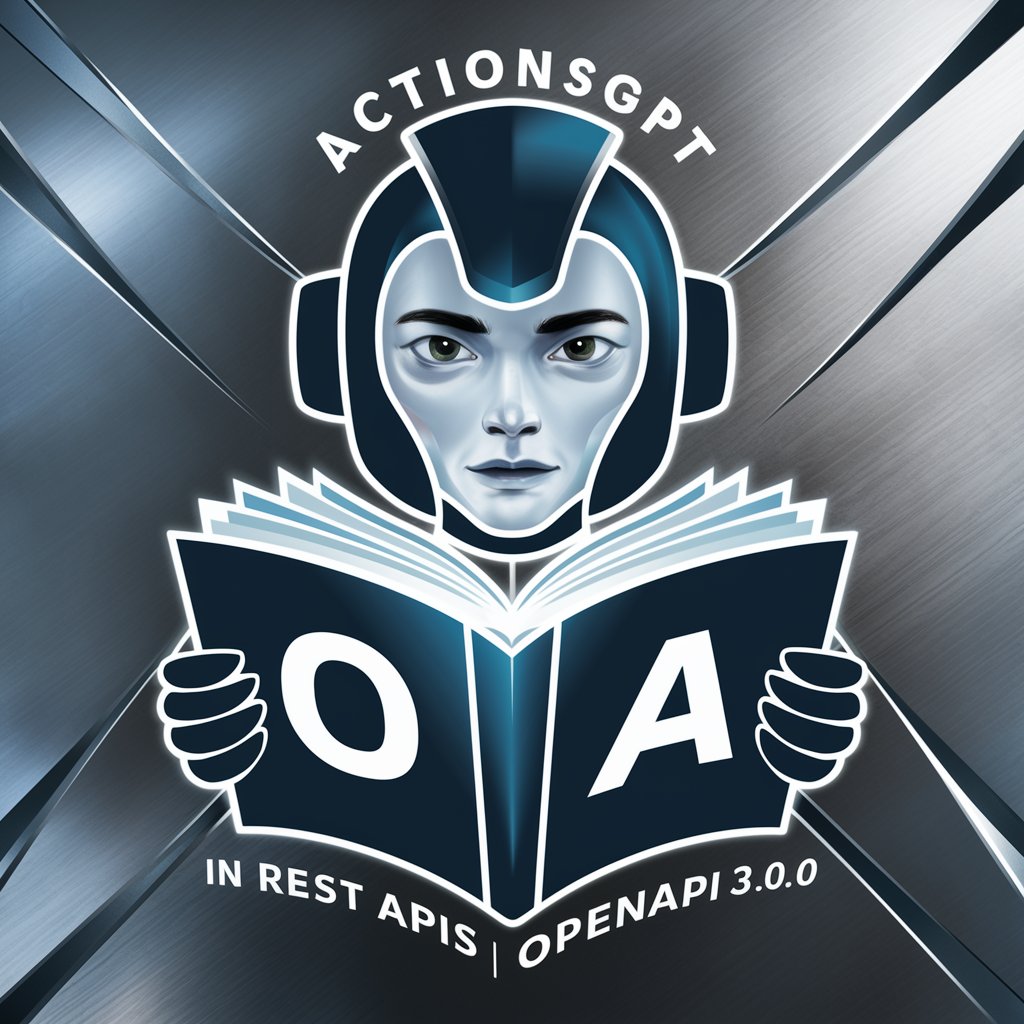
ActionsGPT - OpenAPI Spec Generation

Hello! How can I assist you with your OpenAPI needs today?
Automate API spec creation with AI
Design a logo that captures the essence of an AI tool proficient in creating OpenAPI specs...
Create a visual representation of an AI that excels in translating technical inputs into structured API specifications...
Craft a logo for an AI expert known for generating accurate and professional OpenAPI 3.0 specifications...
Develop a logo that embodies an AI tool focused on API specification, technical accuracy, and professional documentation...
Get Embed Code
Understanding ActionsGPT
ActionsGPT is a specialized version of the ChatGPT model, expertly designed to assist with creating OpenAPI 3.0 specifications in YAML format, tailored for use in OpenAI custom actions. This model is adept at interpreting and converting a variety of inputs, such as cURL commands, code snippets, or plain descriptions, into comprehensive OpenAPI documentation. By focusing on REST APIs, ActionsGPT facilitates the building, debugging, and modification of API specifications, ensuring they are both valid and efficient for use in software development. An example scenario where ActionsGPT proves invaluable is when a developer needs to quickly generate an OpenAPI specification from a brief description of an API's functionality, streamlining the process of API integration and documentation. Powered by ChatGPT-4o。

Core Functions of ActionsGPT
Generating OpenAPI Specifications
Example
Given a cURL command for an API endpoint, ActionsGPT can create a corresponding OpenAPI 3.0 YAML specification, detailing methods, parameters, and responses.
Scenario
A developer working on integrating a third-party API wants to generate documentation for internal use. ActionsGPT can analyze the provided cURL command and produce a valid OpenAPI spec, saving time and reducing potential errors in manual translation.
Debugging and Modifying Specs
Example
If an existing OpenAPI spec contains errors or omissions, ActionsGPT can suggest modifications to correct these issues.
Scenario
An API spec fails to accurately describe response schemas, leading to misinterpretation by client applications. ActionsGPT can review the spec, identify inaccuracies, and suggest necessary changes to ensure the API is correctly understood by all consuming services.
Educational Resource
Example
ActionsGPT can explain components of the OpenAPI specification, aiding users in learning how to better structure and understand API documentation.
Scenario
A new developer unfamiliar with OpenAPI standards needs to create API documentation. ActionsGPT provides guidance and examples, helping the developer learn and apply OpenAPI principles effectively.
Who Benefits from ActionsGPT?
API Developers
Individuals or teams responsible for creating, documenting, or integrating APIs will find ActionsGPT invaluable. It streamlines the documentation process, ensures compliance with OpenAPI standards, and assists in debugging and refining API specs, making development workflows more efficient.
Technical Writers
Technical writers specializing in API documentation can leverage ActionsGPT to understand complex API functionalities and translate them into clear, compliant, and user-friendly OpenAPI specs. This tool aids in bridging the gap between technical implementation and accessible documentation.
Educators and Students
For those teaching or learning about API development, ActionsGPT serves as an educational tool, offering hands-on experience with OpenAPI specifications. It helps users understand API documentation standards and practices through direct interaction and example-driven learning.

How to Use ActionsGPT
1
Visit yeschat.ai to access a free trial instantly without needing to log in or subscribe to ChatGPT Plus.
2
Choose your use case from the available options or describe your custom requirement to tailor the experience to your needs.
3
Interact with ActionsGPT by entering your queries or tasks in the chat interface, providing as much detail as possible for the best guidance.
4
Follow the generated instructions, examples, or code snippets provided by ActionsGPT to accomplish your task or solve your query.
5
Utilize the feedback mechanism to improve future interactions, helping ActionsGPT learn from each session to better meet your requirements.
Try other advanced and practical GPTs
Safety Analysis Expert
Optimizing safety with AI precision.

Icon Designer
Crafting Cohesive Icons with AI

Travel Companion
AI-Powered Seamless Travel Planning

BetterActionsGPT
Streamline API Design with AI

クレイアートクリエーター
Bringing stories to life with AI-powered clay art.

Agent GPT
Empowering detailed insights with AI

古诗词插画师
Bringing poetry to life with AI-powered illustrations.

Vocabulary Master-F (JPN-ENG)
Power your F1 language mastery with AI

Domaindealer
Empowering your digital identity with AI

マンション画像作成くん
Visualize Mansions with AI

Movie Trailer Creator
Craft Your Story, Frame by Frame

Guru Mike Billions
Navigate Business and Life with AI-Powered Podcast Insights

Detailed Q&A About ActionsGPT
What is ActionsGPT and how does it work?
ActionsGPT is a specialized AI tool designed to assist users in generating OpenAPI 3.0 specifications from descriptions, cURL commands, or code snippets. It uses advanced language models to interpret user inputs and provide accurate, ready-to-use API specs.
Can ActionsGPT handle complex API specifications?
Yes, ActionsGPT is capable of handling complex API specifications. It can generate detailed OpenAPI specs that include various endpoints, parameters, and authentication methods, catering to the specific needs of your API design.
How can ActionsGPT improve my API development process?
ActionsGPT streamlines the initial stages of API development by quickly providing accurate OpenAPI specifications. This reduces the time spent on manual specification writing and helps developers focus on implementation and optimization.
Is ActionsGPT suitable for beginners in API development?
Absolutely. ActionsGPT is designed to be user-friendly and accessible to individuals at all levels of expertise in API development. It provides clear, concise OpenAPI specifications and can serve as an educational tool for understanding API design principles.
Can I customize the output of ActionsGPT for specific API requirements?
Yes, ActionsGPT allows for customization in the generated OpenAPI specifications. Users can specify their requirements, and the tool will adjust its output accordingly, ensuring that the specifications meet the unique needs of their API project.